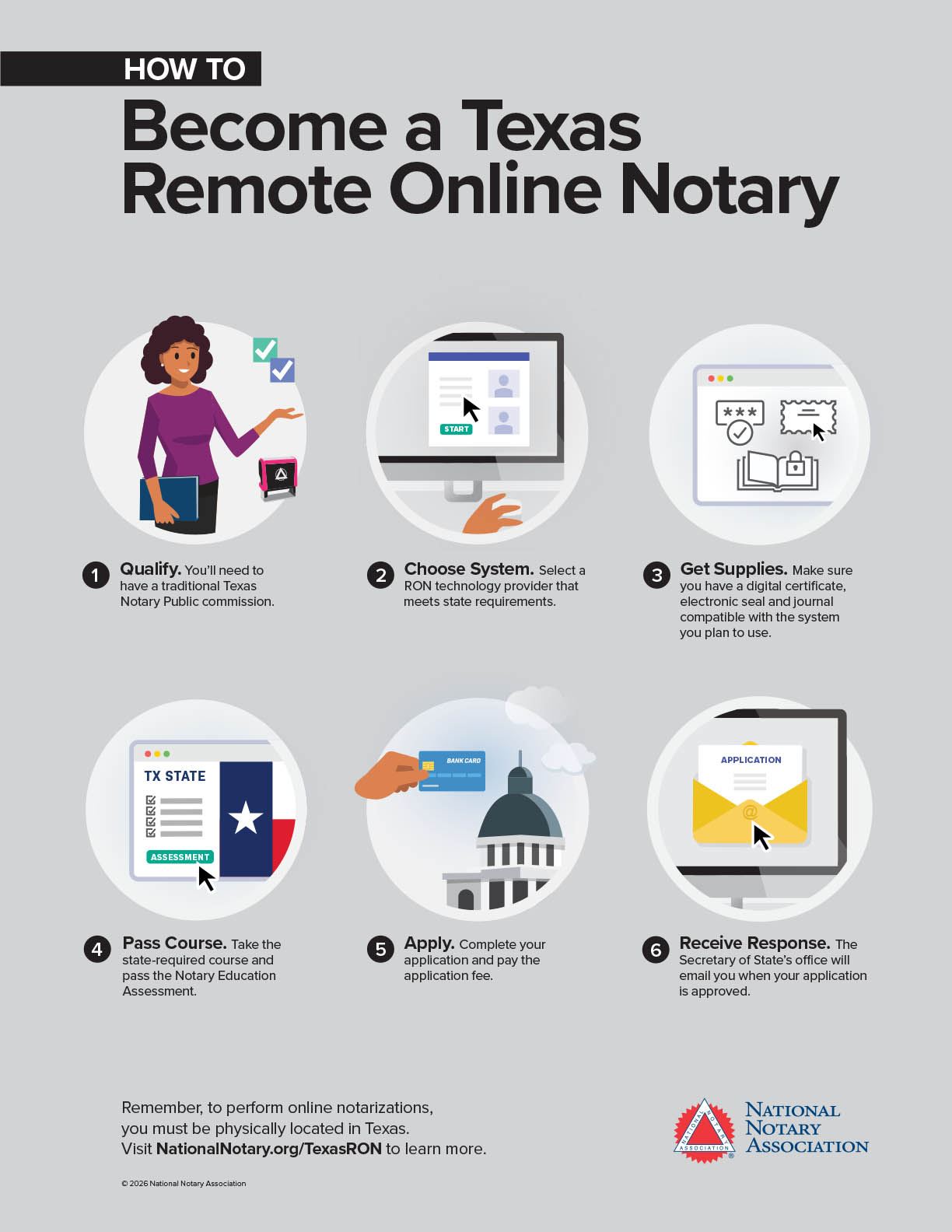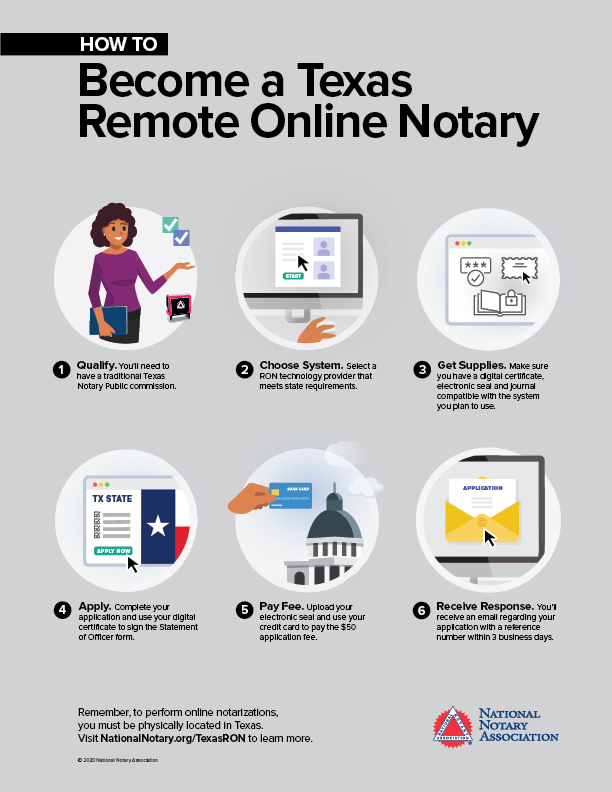As of July 1, 2018, Texas Notaries may register to perform remote online notarizations (RONs). If you want to become a TX Online Notary, here are the steps you are required to take:

- Hold an existing commission as a traditional Notary Public.
- Choose a RON vendor.
- Buy a digital certificate and eSeal that is compatible with the RON vendor you choose.
- Pay the $20 Online Notary Education fee (plus state service fee) and pass the Online Notary Education course and Notary Education Assessment in the TX SOS Notary Portal.
- Complete the Online Commission application in the TX SOS Notary Portal.
- Pay the $50 application fee plus state service fee.
- Once your application has been approved, you’ll receive an email with instructions for downloading your Online Notary commission.
In This Guide: Texas RON Requirements | About RON in Texas | Additional FAQs
Requirements to be a Remote Notary in Texas
In order to apply for authorization as a TX Online Notary, you must first hold an existing commission as a traditional Notary Public in the Lone Star State. Traditional Notaries are required to be at least 18 years old and a legal resident of Texas with no conviction of a felony or a crime of moral turpitude.
Is training or an exam required to become a TX remote Notary?
Yes. All Texas Notaries applying to become an Online Notary must take a course provided by the Secretary of State. Applicants must pay the $20 education fee, plus a $0.71 state service fee, in the Texas Secretary of State Portal before accessing the course.
The course consists of four videos followed by a Notary Education Assessment. Applicants must complete at least 70% of the questions in the Education Assessment within 30 minutes.
What tools and technology do I need to perform remote online notarizations?
A computer, webcam, microphone and secure connection to the internet are all necessary to provide RON services. Your computer must be able to support two-way audio and visual communication. The Texas Secretary of State cannot recommend a list of approved third-party technology providers, but BlueNotary, DocuSign, DocVerify, NotaryCam, Pavaso, Proof, ProNotary and SIGNiX all offer end-to-end online notarization platforms that meet state requirements for virtual notarizations.
Texas remote online Notaries must also have a digital certificate containing their signature, an electronic seal (BPM, JPEG, PNG or TIF format), and an electronic journal. There are plenty of companies that offer individual or bundles of electronic Notary supplies, including the NNA. Before you buy anything, make sure everything in your shopping cart is compatible with the RON technology provider you choose to work with.
Do I need another surety bond?
Texas does not require online Notaries to get a bond in addition to the $10,000 surety bond required for traditional commissions. The surety bond for traditional Notaries covers remote notarial acts.
Why should I get an E&O insurance policy?
Unlike a surety bond, an errors and omissions (E&O) insurance policy protects you as a Notary Public. Mistakes happen, and an insurance policy can cover any mishaps that might occur during notarizations.

About Remote Online Notarization (RON) in Texas
Performing a notarization without the signer physically in front of you may be a new concept for Notaries and signers alike, but you'll quickly learn how secure and convenient RONs can be.
Are online notarizations legal in Texas?
Yes, Texas Notaries Public who hold a separate commission as an Online Notary are authorized to perform virtual notarizations remotely. On July 1, 2018, Texas became the third state to permit RON services.
How do Online Notary services work?
In Texas online notarizations, the signer personally appears before the Notary Public in real-time using audio-video technology. The Notary confirms the signer’s identity by either having personal knowledge or each of the following: remote presentation of a government-issued ID containing a photo and signature of the signer, credential analysis of the ID, and identity proofing. The Notary also needs to screen the signer for willingness and awareness before proceeding.
Once all of those steps are taken, they complete the notarization with the attachment of an electronic Notary seal and a digital certificate. The Notary then records the online notarization in an electronic journal, and the video recording of the session is stored.
Commissioned online Notaries in Texas can perform remote notarizations for a signer in any physical location. However, the Notary must be physically located in the state of Texas at the time of the notarial act.
What types of notarizations are permitted online?
Texas allows online Notaries to perform the same notarial acts as traditional Notaries remotely, including:
- Taking acknowledgments or proofs of written instruments
- Administering oaths and affirmations
- Taking depositions
- Certifying copies of documents not recordable in the public records
- Protesting instruments permitted by law to be protested
Additional RON FAQs
Check out the information below for answers to commonly asked questions about working as a remote Notary.
How much does it cost to become a TX Online Notary?
The cost of becoming a Remote Online Notary in Texas ranges from below $100 to a few hundred dollars, depending on the companies you choose to work with and a variety of other factors. For example, you will need to pay the Secretary of State the $20 training course fee (plus a $0.71 state service fee) and $50 Online Notary application fee (plus a $0.57 state service fee). You'll also need to pay any sign-up fees associated with your preferred RON technology provider and purchase your digital supplies like the eSeal and digital certificate.
The cost for you to maintain a $10,000 surety bond and recommended E&O insurance policy may vary depending on your credit history among other factors.
You may already have a computer, webcam, microphone and secure internet access set up at home, but if you don't, you will need to factor that equipment into your startup costs as well.
How much can online Notaries charge in Texas?
According to the TX Secretary of State website, online Notaries may charge up to $25 per notarization on top of the regular Notary charges. For example, a remote Notary can charge a total of $35 to notarize the signature of a single signer, which breaks down to $25 for the online notarization and $10 for the regular Notary fee of notarizing a signature.
How long does it take to become a virtual Notary?
It can take up to six weeks to become a TX Online Notary. Up to four of those weeks will be spent on the first step of the registration process: becoming a traditional Notary. The rest of the process can be done fairly quickly.
After you receive your commission as a traditional Notary Public, you will spend one day choosing a RON technology provider and getting your supplies, one day getting a quote for the recommended E&O policy and one day completing your application online. Then, you will need to complete the Secretary of State’s Online Notary education course and Notary Education Assessment, and submit the Online Notary application.
You will receive a confirmation email from the Texas Secretary of State upon submitting your Online Notary application. Once your application has been reviewed and approved, you’ll receive an email from the Secretary of State providing further instructions.
How long will my remote Notary commission last?
Online Notary commissions run concurrently with traditional Notary Public commissions in Texas, meaning both will expire on the same day. To renew an online commission, you must first renew your traditional Notary commission.
Can I remotely notarize paper documents?
Yes, starting on January 1, 2024, a remote Notary may notarize paper documents. You will need to keep a record of any remotely notarized paper documents in your journal, and you will need to keep an audio-video recording of the transaction.
During a remote paper notarization, the signer will need to include an additional document that confirms the document they send to the Notary is the same document from the remote notarization meeting online. The signer will need to send their signed documents and declaration no later than 3 days after meeting with you. You must complete the paper notarization and return the documents no later than 10 days after meeting the signer online.
Will RON services grow my TX Notary business?
Yes, becoming a Remote Online Notary and joining a RON platform can help your business grow. Your customer base is no longer limited to Texas residents when you're an online Notary. You may notarize for signers outside of the state border or anywhere else as long as you're physically located in Texas at the time of notarization.
You may also consider becoming a certified Notary Signing Agent (NSA). Getting your NSA certification can make you eligible to receive more RON assignments and ensures RON service providers you've passed a current background screening.
Before providing your NSA services, pay attention to specific instructions from your contracting company. For example, Home Equity Line of Credit (HELOC) loans must be signed and closed in the office of a lender, attorney or title company. Check with your contracting company for more details.
Back to Top
Last updated: Jan 2, 2026